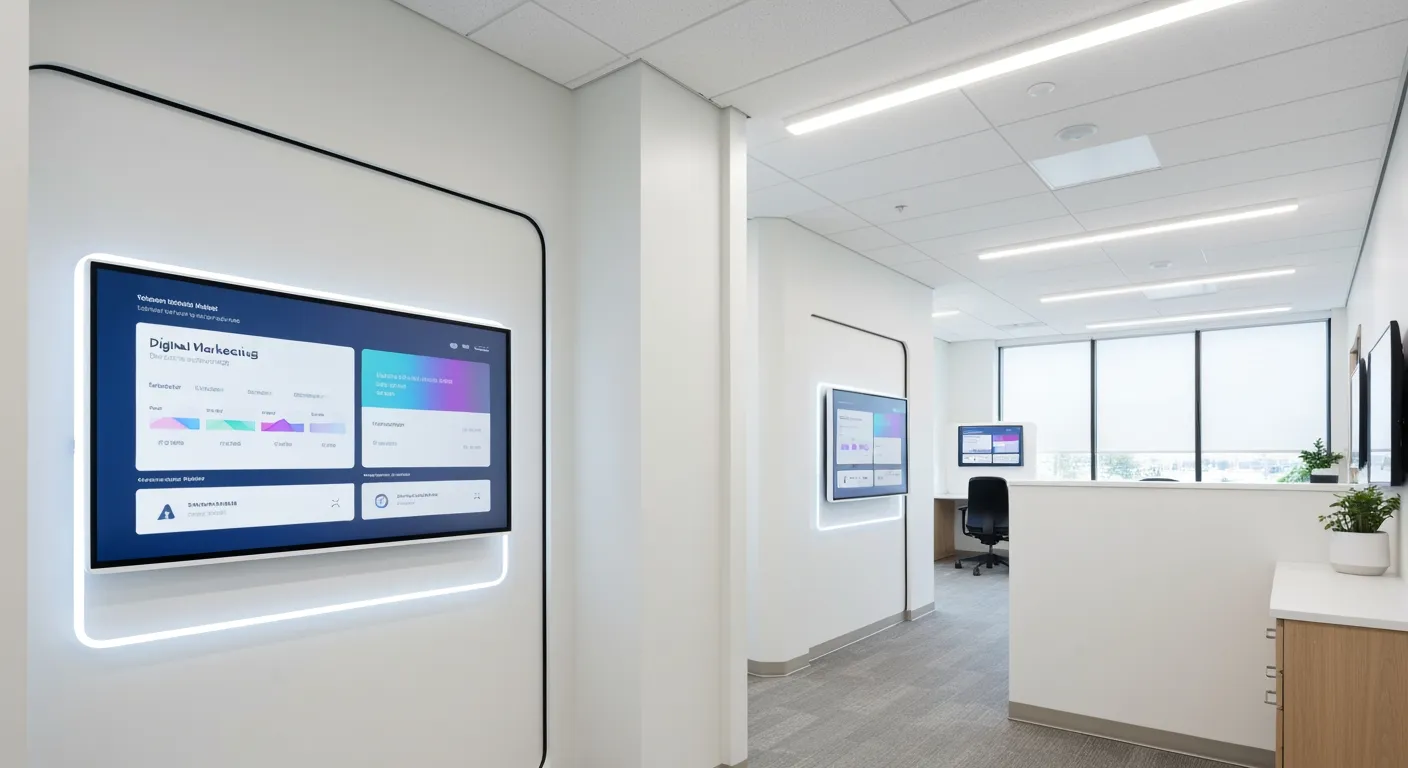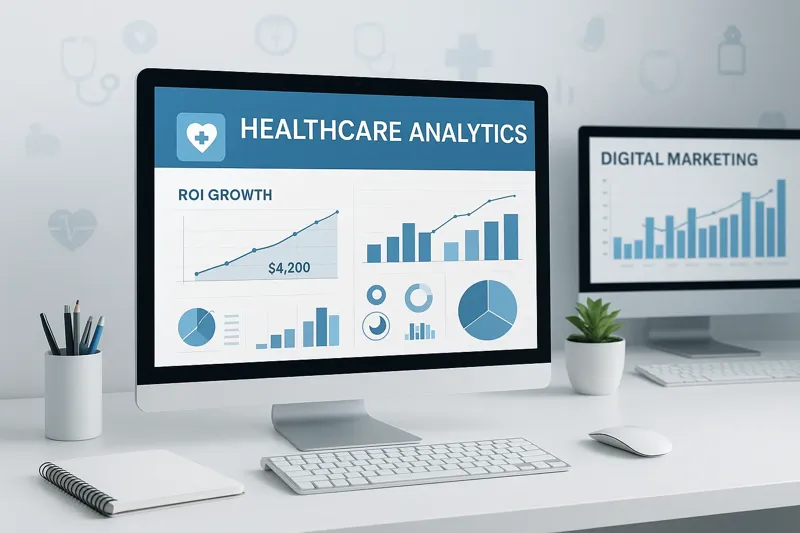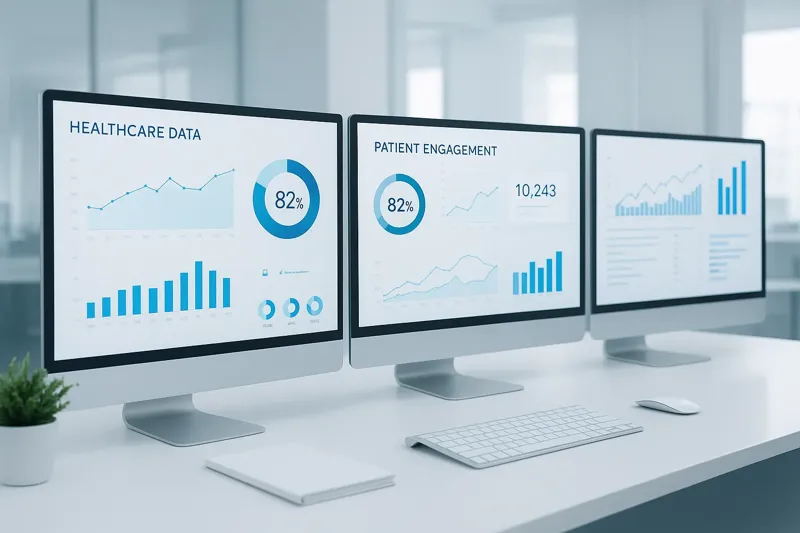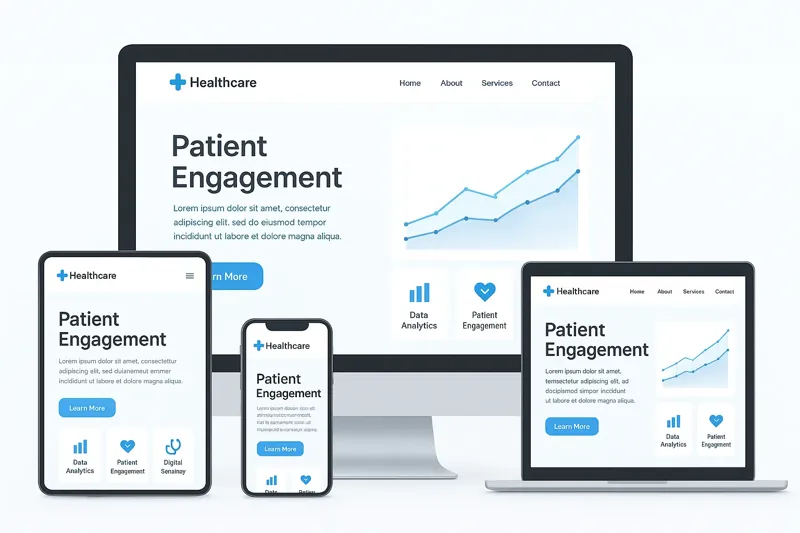Introduction: The Imperative of Digital Marketing in Modern Healthcare
The Growing Importance of Digital Presence in Healthcare
In today's healthcare landscape, having a robust digital presence is essential for providers seeking to attract and retain patients. Research shows that over 70% of patients begin their healthcare journey by searching online for nearby clinics, doctors, and hospitals. This trend underscores the need for healthcare organizations to prioritize digital visibility to remain competitive.
Patients' Increasing Reliance on Online Research
More than 80% of patients evaluate online reviews, social media profiles, and website content before making healthcare decisions. This heightened scrutiny means that patient acquisition increasingly depends on the quality and reliability of a provider’s digital footprint. Online reputation management, including timely responses to reviews, plays a critical role in building trust.
Key Digital Marketing Channels for Healthcare Providers
Healthcare organizations should leverage a blend of digital marketing tactics to meet patient expectations and drive measurable results. Core strategies include:
- Search Engine Optimization (SEO): Optimizing websites with relevant keywords and mobile-friendly designs to improve search engine rankings and attract quality traffic.
- Social Media Marketing: Engaging patients on platforms like Facebook and Instagram to share educational content, health tips, and provider updates.
- Pay-Per-Click (PPC) Advertising: Targeted ads that ensure visibility and generate immediate patient leads.
- Content Marketing: Producing blogs, videos, and patient stories to educate audiences and enhance authority.
- Email and SMS Campaigns: Personalized outreach to remind patients about appointments and promote services.
Together, these channels enable healthcare providers to build trust, increase patient engagement, and drive growth in today’s digitally driven market.
Search Engine Optimization: Boosting Visibility and Local Reach

What Are SEO Fundamentals for Healthcare Providers?
Search engine optimization (SEO) is crucial for healthcare providers aiming to increase their online visibility and attract patients. Essential SEO practices include incorporating relevant keywords into website content and metadata to align with Patient online search behavior. Optimizing website structure and load speed improves user experience and search rankings. Most importantly, healthcare websites must be mobile-friendly, as over half of healthcare searches happen on mobile devices. This ensures patients can easily navigate and book appointments via smartphones, meeting modern accessibility expectations, as emphasized in Mobile-friendly healthcare websites and healthcare practice website design.
How Does Local SEO Enhance Patient Acquisition?
Local SEO strategies empower healthcare providers to target patients in specific geographic areas effectively. Optimizing listings on platforms like Google Business Profile, along with maintaining accurate and updated contact information, ensures providers appear prominently in local search results and the Google 3-pack—a critical driver for attracting nearby patients. Expertise in gathering and managing patient reviews online also bolsters local reputation, building trust and influencing prospective patient decisions, as highlighted in Importance of online reviews in healthcare.
What Is the Impact of SEO on Healthcare Website Traffic and Patient Growth?
Robust SEO efforts significantly increase quality website traffic, leading to higher patient acquisition rates. Healthcare organizations leveraging SEO report enhanced online authority and engagement, as patients find reliable informational content and service details easily. Consistent SEO practices drive sustained growth by positioning healthcare practices at the forefront when patients conduct online research prior to booking appointments, consistent with insights from Healthcare digital marketing strategies and SEO for healthcare. Ultimately, well-executed SEO translates into measurable increases in bookings and patient retention, supported by Healthcare marketing analytics and Data-driven healthcare marketing.
Content Marketing: Establishing Authority and Educating Patients

Creating compelling, educational blog posts and videos
Healthcare providers can significantly enhance their online presence by producing detailed, informative blog posts and videos that address common patient concerns, explain medical procedures, and provide wellness tips. Such content not only attracts new visitors through search engines but also serves as a valuable resource for existing patients, fostering ongoing engagement. For more on content marketing for healthcare, blogs for healthcare marketing, and educational Healthcare Content, see these resources.
Utilizing content to build trust and establish professional expertise
Educational content verified and approved by healthcare professionals helps establish credibility and reinforces trust among patients. Regularly publishing authoritative articles and case studies showcases a practice’s expertise and commitment to patient education, which is pivotal for building long-term relationships. Learn about building trust with patient reviews, healthcare marketing strategies, and healthcare marketing ideas.
Leveraging video marketing for patient engagement and SEO benefits
Video content, including patient testimonials, provider introductions, and educational webinars, enhances patient engagement and trust. Videos are highly effective SEO tools, increasing website conversions by up to 80% on landing pages. Additionally, videos facilitate complex health information delivery in an accessible format, making them indispensable in modern healthcare marketing strategies. Explore more about video marketing in healthcare, educational healthcare videos, and patient education videos.
Social Media Engagement: Building Community and Trust
Why Are Social Media Platforms Important in Patient Decision-Making?
Social media has become a dominant force in healthcare digital marketing strategies, with over 40% of potential patients learning about healthcare providers through social channels. These platforms offer a unique space where patients research, share experiences, and connect directly with providers. A strong social media presence helps build credibility, increases visibility, and fosters patient trust — all crucial factors that influence patient decision-making and social media.
How Should Healthcare Providers Select Social Media Platforms?
Choosing the right social media platforms depends on the demographics and preferences of the target patient audience. For example, Facebook appeals to a broad adult demographic, Instagram suits younger and visually oriented users, while LinkedIn targets professional networks. Tailoring content to each platform ensures engagement effectiveness and better resource utilization. This approach aligns with social media marketing in healthcare and healthcare social media marketing.
How Can Healthcare Providers Ensure HIPAA Compliance in Social Media?
Maintaining patient privacy and adhering to HIPAA regulations are paramount when communicating on social media. Providers must avoid sharing identifiable patient information without consent and implement clear policies on online interactions. Training staff on compliance and monitoring content regularly helps mitigate risks and uphold professional standards, as emphasized in HIPAA compliance in social media and ethical healthcare marketing.
How Do Partnerships with Influencers and Social Personalities Expand Healthcare Reach?
Collaborations with trusted influencers and health advocates amplify the provider’s message and extend outreach to new audiences. Influencers sharing personal health journeys or endorsing services lend authenticity and increase patient awareness. Successful campaigns, like those by Acıbadem Senology Institute’s Pink Ribbon Project, demonstrate the power of healthcare influencer partnerships and influencer partnerships in health in building brand authority and community engagement.
Pay-Per-Click Advertising: Targeted Patient Acquisition
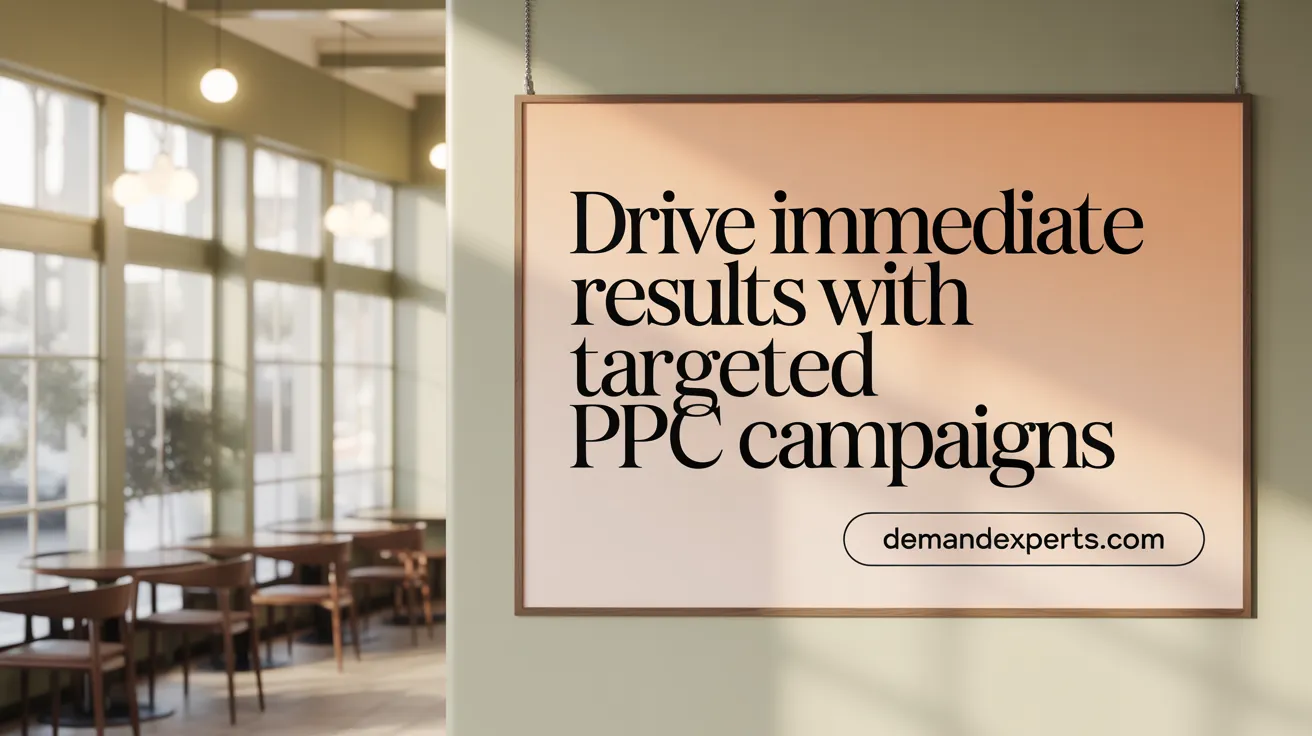
How PPC complements SEO for immediate visibility
Search Engine Optimization (SEO for healthcare providers) lays the foundation for long-term organic search visibility, but Pay-Per-Click (PPC advertising benefits advertising delivers immediate presence on search engines and social media platforms. While SEO optimizes website content to rank higher over time, PPC ensures healthcare providers appear prominently for key search terms the moment campaigns launch. This simultaneous approach enhances overall visibility and captures patient attention across multiple touchpoints, accelerating lead acquisition.
Use of PPC for demographic and geographic targeting
PPC campaigns offer precise targeting capabilities crucial for healthcare organizations. Advertisers can define demographics such as age, gender, and health interests, alongside geographic locations down to specific cities or neighborhoods. This precision allows healthcare providers to optimize ad spend by focusing on high-value patient segments and local communities actively searching for relevant services. For example, hospitals and practices use PPC to target nearby patients needing specialty treatments or urgent care (Hospital Marketing Strategies).
Benefits of retargeting and measurable results in healthcare campaigns
Retargeting through PPC enables marketers to re-engage users who have previously interacted with their website or ads, increasing conversion rates by reinforcing brand recall. Healthcare providers benefit from this by nurturing patient interest through timely reminders or service promotions. Furthermore, PPC offers detailed analytics and real-time campaign performance data, allowing ongoing optimization and transparency in Return on Investment (ROI). This measurable effectiveness makes PPC a cost-efficient and accountable strategy for patient acquisition in healthcare marketing (Healthcare PPC advertising.
Email and SMS Marketing: Personalized Patient Communication
High open and engagement rates of emails in healthcare
Email marketing remains a highly effective channel in healthcare, boasting open rates around 21.5%. This makes it a reliable tool for engaging patients with updates, promotions, and educational content while reinforcing trust and loyalty. For more on Email marketing effectiveness in healthcare, see this resource.
Segmenting patient lists for customized content delivery
Segmenting patient databases based on demographics, health needs, and behaviors enables healthcare providers to deliver targeted and relevant messages. Personalized emails tailored to specific patient groups improve engagement, response rates, and overall satisfaction. Learn more about Patient segmentation in email campaigns.
Automation tools for reminders, promotions, and educational campaigns
Automation platforms streamline timely communication by sending appointment reminders, health check notifications, and tailored educational campaigns without manual intervention. Tools like Omnisend and HIPAA-compliant systems facilitate consistent outreach that nurtures patient relationships and improves care compliance. See details about Automation tools for patient communication and HIPAA compliance in digital marketing.
Role of SMS marketing in timely patient updates
SMS marketing complements email by offering instant, portable communication, ideal for appointment reminders, medication instructions, and urgent updates. Its immediacy ensures higher visibility and engages patients effectively, especially when coordinated with automated email campaigns for a seamless communication experience. Explore the benefits of SMS marketing in healthcare, and SMS marketing in healthcare.
Optimizing Online Reputation: Managing Reviews and Testimonials

How Do Patient Reviews Impact Healthcare Decisions?
Patient reviews are a critical factor in healthcare decision-making, as over 80% of patients evaluate online reviews, social media profiles, and websites before booking appointments. Credible reviews act like personal recommendations, with 98% of consumers viewing them as essential in their choice of providers. Positive reviews enhance trust and brand credibility, directly influencing patient acquisition and retention. For more on the importance of online reviews for medical practices and managing online reputation in healthcare, see these resources.
What Are Effective Strategies to Encourage, Collect, and Respond to Reviews Promptly?
Healthcare practices can proactively build their online reputation by requesting reviews from patients immediately following appointments. Making the review process easy through direct links and reminders encourages higher response rates. Promptly responding to reviews, both positive and negative, demonstrates transparency, care, and professionalism, helping to maintain and improve patient trust. Managing online reputation through consistent monitoring and engagement is vital. Learn about using patient testimonials in healthcare marketing and optimizing healthcare marketing strategies for more ideas.
How Can Showcasing Testimonials Build Credibility and Trust?
Displaying patient testimonials—both written and video—on websites and social media platforms strengthens credibility by providing authentic patient voices. Highlighting staff bios alongside testimonials adds a personalized touch, showcasing team expertise and approachability. Educational content reviewed by healthcare professionals further supports trustworthiness. Combining testimonials with visual media, such as patient stories and video testimonials, increases engagement and encourages new patient referrals. Explore best practices for healthcare digital marketing strategies and content marketing for healthcare to amplify your marketing efforts.
Innovative Engagement Techniques: Gamification and Interactive Tools

How are health apps and gamification used to promote patient wellness?
Health apps incorporating gamification have become powerful tools to engage patients in their wellness journey. By integrating game-like elements such as challenges, rewards, and progress tracking, these apps encourage sustained participation and healthier behaviors. For example, Johnson & Johnson's 7-Minute Workout app motivates users to complete short, effective exercise routines, making wellness accessible and engaging (Gamification in Healthcare Wellness. Gamification fosters a sense of accomplishment and can increase adherence to prescribed health regimens.
What role do interactive waiting rooms play in patient engagement?
Transforming waiting rooms into interactive environments supports ongoing patient education and promotes trust. Incorporating educational videos, testimonial stories, and digital amenities creates a compelling space that informs patients while they wait. These tools continuously engage visitors by sharing expert insights and positive patient experiences (Waiting Room Marketing, subtly reinforcing the healthcare provider's credibility and encouraging greater patient loyalty.
How are AI-powered chatbots integrated for scheduling and triage?
AI-driven chatbots enhance patient engagement by offering 24/7 assistance with appointment scheduling, triage, and answering common health queries. These intelligent platforms streamline communication and reduce administrative burdens by automating routine tasks (AI-powered chatbots in healthcare, AI-powered chatbots in healthcare, AI-powered chatbots in healthcare, AI-powered chatbots in healthcare, AI-powered chatbots in healthcare. Chatbots can quickly guide patients to the right care pathways, improving operational efficiency and patient satisfaction. Additionally, AI chatbots maintain compliance with privacy standards such as HIPAA, ensuring secure and trustworthy interactions (HIPAA Compliance in Digital Marketing).
Data-Driven Marketing: Analytics, Compliance, and Continuous Optimization
Use of analytics tools to measure campaign success and patient behavior
Healthcare marketing increasingly relies on advanced data analytics in healthcare marketing to track the effectiveness of campaigns and understand patient engagement patterns. Tools that analyze website visits, appointment bookings, email responses, and social media interactions empower providers to make data-informed decisions. By continuously monitoring key performance indicators (KPIs), healthcare marketers can identify which tactics drive conversions and tailor strategies accordingly.
HIPAA-compliant tracking and call analytics platforms
Ensuring patient privacy is paramount, and healthcare organizations utilize HIPAA-compliant marketing analytics platforms to safeguard sensitive information while measuring marketing outcomes. Technologies such as HIPAA-compliant call tracking allow marketers to analyze phone interactions generated by campaigns without compromising confidentiality. These platforms enable accurate attribution of patient inquiries to specific marketing channels, supporting compliance with regulatory standards.
Using data to optimize marketing ROI and personalize patient journeys
Data-driven approaches facilitate personalization by leveraging patient behavior and demographic insights to customize messaging and outreach. Predictive analytics help segment audiences, automate timely communications, and deliver relevant health education and reminders, improving patient engagement and retention. Continuous optimization based on real-time analytics maximizes return on investment (ROI) by reallocating budgets to the most effective channels and refining campaign messaging to meet patient needs precisely.
The Role of Healthcare Marketing Agencies: Expertise and Compliance
Benefits of Partnering with Specialized Healthcare Marketing Agencies
Partnering with specialized healthcare marketing agencies offers unique advantages to healthcare providers. These agencies possess deep industry knowledge, including familiarity with medical terminology marketing and regulatory requirements such as HIPAA, ensuring marketing campaigns are both effective and compliant. Agencies like Healthcare Success provide data-driven healthcare marketing strategies that simplify complex medical specialties and deliver solutions tailored to healthcare organizations across hospitals, multi-location practices, and specialty clinics.
Agencies’ Roles in Managing Multi-Channel Campaigns and Compliance
Healthcare marketing agencies manage comprehensive multi-channel campaigns leveraging SEO for healthcare providers, social media marketing in healthcare, healthcare PPC advertising, email campaigns in healthcare, and content marketing for healthcare. They ensure consistent and compliant messaging across platforms, optimizing online presence in healthcare while adhering to healthcare privacy and advertising regulations. Utilizing proprietary reporting systems, agencies offer clients real-time analytics dashboards coupled with HIPAA-compliant call tracking, enabling continuous campaign optimization and measurable ROI improvement.
Case Examples of Successful Agency-Driven Healthcare Digital Marketing
Agencies have demonstrated success through high-impact digital marketing strategies for hospitals and health systems. For instance, Healthcare Success has helped clients generate new patient referrals and build strong brand reputations by combining omnichannel healthcare marketing approaches with ethical, data-driven marketing. Their comprehensive services and expert knowledge have earned strong client testimonials indicative of improved patient acquisition and engagement outcomes. Such results underscore the agency’s critical role in navigating healthcare marketing complexities and driving measurable growth.
Conclusion: Integrating Digital Strategies for Sustainable Healthcare Growth
Building a Unified Digital Marketing Ecosystem
To achieve sustainable growth in healthcare marketing, providers must adopt a cohesive, omnichannel digital marketing approach. This strategy combines SEO, social media, content marketing, email, SMS, PPC advertising, and influencer partnerships to consistently engage patients across multiple platforms. Such integration ensures that messaging is synchronized and reinforces brand presence effectively.
Balancing Innovation with Compliance and Patient Focus
Innovative digital tools—including AI-powered chatbots, mobile-optimized websites, and video marketing—enhance patient engagement and convenience. However, maintaining compliance with healthcare regulations like HIPAA is paramount. Messaging should be patient-centric, transparent, and trust-building to foster long-term relationships while adhering strictly to privacy standards.
Leveraging Data and Expertise for Measurable Growth
Data-driven marketing enables continuous optimization through real-time analytics, allowing healthcare providers to tailor campaigns and measure return on investment effectively. Partnering with specialized marketing agencies that understand healthcare nuances ensures professional guidance, regulatory compliance, and implementation of best practices, driving patient acquisition and retention over time.
By integrating innovation, compliance, and data insights within an omnichannel framework, healthcare organizations position themselves for enduring success and meaningful growth.
Introduction: The Imperative of Digital Marketing in Modern Healthcare
The Growing Importance of Digital Presence in Healthcare
In today's healthcare landscape, having a robust digital presence is essential for providers seeking to attract and retain patients. Research shows that over 70% of patients begin their healthcare journey by searching online for nearby clinics, doctors, and hospitals. This trend underscores the need for healthcare organizations to prioritize digital visibility to remain competitive.
Patients' Increasing Reliance on Online Research
More than 80% of patients evaluate online reviews, social media profiles, and website content before making healthcare decisions. This heightened scrutiny means that patient acquisition increasingly depends on the quality and reliability of a provider’s digital footprint. Online reputation management, including timely responses to reviews, plays a critical role in building trust.
Key Digital Marketing Channels for Healthcare Providers
Healthcare organizations should leverage a blend of digital marketing tactics to meet patient expectations and drive measurable results. Core strategies include:
- Search Engine Optimization (SEO): Optimizing websites with relevant keywords and mobile-friendly designs to improve search engine rankings and attract quality traffic.
- Social Media Marketing: Engaging patients on platforms like Facebook and Instagram to share educational content, health tips, and provider updates.
- Pay-Per-Click (PPC) Advertising: Targeted ads that ensure visibility and generate immediate patient leads.
- Content Marketing: Producing blogs, videos, and patient stories to educate audiences and enhance authority.
- Email and SMS Campaigns: Personalized outreach to remind patients about appointments and promote services.
Together, these channels enable healthcare providers to build trust, increase patient engagement, and drive growth in today’s digitally driven market.
Search Engine Optimization: Boosting Visibility and Local Reach

What Are SEO Fundamentals for Healthcare Providers?
Search engine optimization (SEO) is crucial for healthcare providers aiming to increase their online visibility and attract patients. Essential SEO practices include incorporating relevant keywords into website content and metadata to align with Patient online search behavior. Optimizing website structure and load speed improves user experience and search rankings. Most importantly, healthcare websites must be mobile-friendly, as over half of healthcare searches happen on mobile devices. This ensures patients can easily navigate and book appointments via smartphones, meeting modern accessibility expectations, as emphasized in Mobile-friendly healthcare websites and healthcare practice website design.
How Does Local SEO Enhance Patient Acquisition?
Local SEO strategies empower healthcare providers to target patients in specific geographic areas effectively. Optimizing listings on platforms like Google Business Profile, along with maintaining accurate and updated contact information, ensures providers appear prominently in local search results and the Google 3-pack—a critical driver for attracting nearby patients. Expertise in gathering and managing patient reviews online also bolsters local reputation, building trust and influencing prospective patient decisions, as highlighted in Importance of online reviews in healthcare.
What Is the Impact of SEO on Healthcare Website Traffic and Patient Growth?
Robust SEO efforts significantly increase quality website traffic, leading to higher patient acquisition rates. Healthcare organizations leveraging SEO report enhanced online authority and engagement, as patients find reliable informational content and service details easily. Consistent SEO practices drive sustained growth by positioning healthcare practices at the forefront when patients conduct online research prior to booking appointments, consistent with insights from Healthcare digital marketing strategies and SEO for healthcare. Ultimately, well-executed SEO translates into measurable increases in bookings and patient retention, supported by Healthcare marketing analytics and Data-driven healthcare marketing.
Content Marketing: Establishing Authority and Educating Patients

Creating compelling, educational blog posts and videos
Healthcare providers can significantly enhance their online presence by producing detailed, informative blog posts and videos that address common patient concerns, explain medical procedures, and provide wellness tips. Such content not only attracts new visitors through search engines but also serves as a valuable resource for existing patients, fostering ongoing engagement. For more on content marketing for healthcare, blogs for healthcare marketing, and educational Healthcare Content, see these resources.
Utilizing content to build trust and establish professional expertise
Educational content verified and approved by healthcare professionals helps establish credibility and reinforces trust among patients. Regularly publishing authoritative articles and case studies showcases a practice’s expertise and commitment to patient education, which is pivotal for building long-term relationships. Learn about building trust with patient reviews, healthcare marketing strategies, and healthcare marketing ideas.
Leveraging video marketing for patient engagement and SEO benefits
Video content, including patient testimonials, provider introductions, and educational webinars, enhances patient engagement and trust. Videos are highly effective SEO tools, increasing website conversions by up to 80% on landing pages. Additionally, videos facilitate complex health information delivery in an accessible format, making them indispensable in modern healthcare marketing strategies. Explore more about video marketing in healthcare, educational healthcare videos, and patient education videos.
Social Media Engagement: Building Community and Trust
Why Are Social Media Platforms Important in Patient Decision-Making?
Social media has become a dominant force in healthcare digital marketing strategies, with over 40% of potential patients learning about healthcare providers through social channels. These platforms offer a unique space where patients research, share experiences, and connect directly with providers. A strong social media presence helps build credibility, increases visibility, and fosters patient trust — all crucial factors that influence patient decision-making and social media.
How Should Healthcare Providers Select Social Media Platforms?
Choosing the right social media platforms depends on the demographics and preferences of the target patient audience. For example, Facebook appeals to a broad adult demographic, Instagram suits younger and visually oriented users, while LinkedIn targets professional networks. Tailoring content to each platform ensures engagement effectiveness and better resource utilization. This approach aligns with social media marketing in healthcare and healthcare social media marketing.
How Can Healthcare Providers Ensure HIPAA Compliance in Social Media?
Maintaining patient privacy and adhering to HIPAA regulations are paramount when communicating on social media. Providers must avoid sharing identifiable patient information without consent and implement clear policies on online interactions. Training staff on compliance and monitoring content regularly helps mitigate risks and uphold professional standards, as emphasized in HIPAA compliance in social media and ethical healthcare marketing.
How Do Partnerships with Influencers and Social Personalities Expand Healthcare Reach?
Collaborations with trusted influencers and health advocates amplify the provider’s message and extend outreach to new audiences. Influencers sharing personal health journeys or endorsing services lend authenticity and increase patient awareness. Successful campaigns, like those by Acıbadem Senology Institute’s Pink Ribbon Project, demonstrate the power of healthcare influencer partnerships and influencer partnerships in health in building brand authority and community engagement.
Pay-Per-Click Advertising: Targeted Patient Acquisition

How PPC complements SEO for immediate visibility
Search Engine Optimization (SEO for healthcare providers) lays the foundation for long-term organic search visibility, but Pay-Per-Click (PPC advertising benefits advertising delivers immediate presence on search engines and social media platforms. While SEO optimizes website content to rank higher over time, PPC ensures healthcare providers appear prominently for key search terms the moment campaigns launch. This simultaneous approach enhances overall visibility and captures patient attention across multiple touchpoints, accelerating lead acquisition.
Use of PPC for demographic and geographic targeting
PPC campaigns offer precise targeting capabilities crucial for healthcare organizations. Advertisers can define demographics such as age, gender, and health interests, alongside geographic locations down to specific cities or neighborhoods. This precision allows healthcare providers to optimize ad spend by focusing on high-value patient segments and local communities actively searching for relevant services. For example, hospitals and practices use PPC to target nearby patients needing specialty treatments or urgent care (Hospital Marketing Strategies).
Benefits of retargeting and measurable results in healthcare campaigns
Retargeting through PPC enables marketers to re-engage users who have previously interacted with their website or ads, increasing conversion rates by reinforcing brand recall. Healthcare providers benefit from this by nurturing patient interest through timely reminders or service promotions. Furthermore, PPC offers detailed analytics and real-time campaign performance data, allowing ongoing optimization and transparency in Return on Investment (ROI). This measurable effectiveness makes PPC a cost-efficient and accountable strategy for patient acquisition in healthcare marketing (Healthcare PPC advertising.
Email and SMS Marketing: Personalized Patient Communication
High open and engagement rates of emails in healthcare
Email marketing remains a highly effective channel in healthcare, boasting open rates around 21.5%. This makes it a reliable tool for engaging patients with updates, promotions, and educational content while reinforcing trust and loyalty. For more on Email marketing effectiveness in healthcare, see this resource.
Segmenting patient lists for customized content delivery
Segmenting patient databases based on demographics, health needs, and behaviors enables healthcare providers to deliver targeted and relevant messages. Personalized emails tailored to specific patient groups improve engagement, response rates, and overall satisfaction. Learn more about Patient segmentation in email campaigns.
Automation tools for reminders, promotions, and educational campaigns
Automation platforms streamline timely communication by sending appointment reminders, health check notifications, and tailored educational campaigns without manual intervention. Tools like Omnisend and HIPAA-compliant systems facilitate consistent outreach that nurtures patient relationships and improves care compliance. See details about Automation tools for patient communication and HIPAA compliance in digital marketing.
Role of SMS marketing in timely patient updates
SMS marketing complements email by offering instant, portable communication, ideal for appointment reminders, medication instructions, and urgent updates. Its immediacy ensures higher visibility and engages patients effectively, especially when coordinated with automated email campaigns for a seamless communication experience. Explore the benefits of SMS marketing in healthcare, and SMS marketing in healthcare.
Optimizing Online Reputation: Managing Reviews and Testimonials

How Do Patient Reviews Impact Healthcare Decisions?
Patient reviews are a critical factor in healthcare decision-making, as over 80% of patients evaluate online reviews, social media profiles, and websites before booking appointments. Credible reviews act like personal recommendations, with 98% of consumers viewing them as essential in their choice of providers. Positive reviews enhance trust and brand credibility, directly influencing patient acquisition and retention. For more on the importance of online reviews for medical practices and managing online reputation in healthcare, see these resources.
What Are Effective Strategies to Encourage, Collect, and Respond to Reviews Promptly?
Healthcare practices can proactively build their online reputation by requesting reviews from patients immediately following appointments. Making the review process easy through direct links and reminders encourages higher response rates. Promptly responding to reviews, both positive and negative, demonstrates transparency, care, and professionalism, helping to maintain and improve patient trust. Managing online reputation through consistent monitoring and engagement is vital. Learn about using patient testimonials in healthcare marketing and optimizing healthcare marketing strategies for more ideas.
How Can Showcasing Testimonials Build Credibility and Trust?
Displaying patient testimonials—both written and video—on websites and social media platforms strengthens credibility by providing authentic patient voices. Highlighting staff bios alongside testimonials adds a personalized touch, showcasing team expertise and approachability. Educational content reviewed by healthcare professionals further supports trustworthiness. Combining testimonials with visual media, such as patient stories and video testimonials, increases engagement and encourages new patient referrals. Explore best practices for healthcare digital marketing strategies and content marketing for healthcare to amplify your marketing efforts.
Innovative Engagement Techniques: Gamification and Interactive Tools

How are health apps and gamification used to promote patient wellness?
Health apps incorporating gamification have become powerful tools to engage patients in their wellness journey. By integrating game-like elements such as challenges, rewards, and progress tracking, these apps encourage sustained participation and healthier behaviors. For example, Johnson & Johnson's 7-Minute Workout app motivates users to complete short, effective exercise routines, making wellness accessible and engaging (Gamification in Healthcare Wellness. Gamification fosters a sense of accomplishment and can increase adherence to prescribed health regimens.
What role do interactive waiting rooms play in patient engagement?
Transforming waiting rooms into interactive environments supports ongoing patient education and promotes trust. Incorporating educational videos, testimonial stories, and digital amenities creates a compelling space that informs patients while they wait. These tools continuously engage visitors by sharing expert insights and positive patient experiences (Waiting Room Marketing, subtly reinforcing the healthcare provider's credibility and encouraging greater patient loyalty.
How are AI-powered chatbots integrated for scheduling and triage?
AI-driven chatbots enhance patient engagement by offering 24/7 assistance with appointment scheduling, triage, and answering common health queries. These intelligent platforms streamline communication and reduce administrative burdens by automating routine tasks (AI-powered chatbots in healthcare, AI-powered chatbots in healthcare, AI-powered chatbots in healthcare, AI-powered chatbots in healthcare, AI-powered chatbots in healthcare. Chatbots can quickly guide patients to the right care pathways, improving operational efficiency and patient satisfaction. Additionally, AI chatbots maintain compliance with privacy standards such as HIPAA, ensuring secure and trustworthy interactions (HIPAA Compliance in Digital Marketing).
Data-Driven Marketing: Analytics, Compliance, and Continuous Optimization
Use of analytics tools to measure campaign success and patient behavior
Healthcare marketing increasingly relies on advanced data analytics in healthcare marketing to track the effectiveness of campaigns and understand patient engagement patterns. Tools that analyze website visits, appointment bookings, email responses, and social media interactions empower providers to make data-informed decisions. By continuously monitoring key performance indicators (KPIs), healthcare marketers can identify which tactics drive conversions and tailor strategies accordingly.
HIPAA-compliant tracking and call analytics platforms
Ensuring patient privacy is paramount, and healthcare organizations utilize HIPAA-compliant marketing analytics platforms to safeguard sensitive information while measuring marketing outcomes. Technologies such as HIPAA-compliant call tracking allow marketers to analyze phone interactions generated by campaigns without compromising confidentiality. These platforms enable accurate attribution of patient inquiries to specific marketing channels, supporting compliance with regulatory standards.
Using data to optimize marketing ROI and personalize patient journeys
Data-driven approaches facilitate personalization by leveraging patient behavior and demographic insights to customize messaging and outreach. Predictive analytics help segment audiences, automate timely communications, and deliver relevant health education and reminders, improving patient engagement and retention. Continuous optimization based on real-time analytics maximizes return on investment (ROI) by reallocating budgets to the most effective channels and refining campaign messaging to meet patient needs precisely.
The Role of Healthcare Marketing Agencies: Expertise and Compliance
Benefits of Partnering with Specialized Healthcare Marketing Agencies
Partnering with specialized healthcare marketing agencies offers unique advantages to healthcare providers. These agencies possess deep industry knowledge, including familiarity with medical terminology marketing and regulatory requirements such as HIPAA, ensuring marketing campaigns are both effective and compliant. Agencies like Healthcare Success provide data-driven healthcare marketing strategies that simplify complex medical specialties and deliver solutions tailored to healthcare organizations across hospitals, multi-location practices, and specialty clinics.
Agencies’ Roles in Managing Multi-Channel Campaigns and Compliance
Healthcare marketing agencies manage comprehensive multi-channel campaigns leveraging SEO for healthcare providers, social media marketing in healthcare, healthcare PPC advertising, email campaigns in healthcare, and content marketing for healthcare. They ensure consistent and compliant messaging across platforms, optimizing online presence in healthcare while adhering to healthcare privacy and advertising regulations. Utilizing proprietary reporting systems, agencies offer clients real-time analytics dashboards coupled with HIPAA-compliant call tracking, enabling continuous campaign optimization and measurable ROI improvement.
Case Examples of Successful Agency-Driven Healthcare Digital Marketing
Agencies have demonstrated success through high-impact digital marketing strategies for hospitals and health systems. For instance, Healthcare Success has helped clients generate new patient referrals and build strong brand reputations by combining omnichannel healthcare marketing approaches with ethical, data-driven marketing. Their comprehensive services and expert knowledge have earned strong client testimonials indicative of improved patient acquisition and engagement outcomes. Such results underscore the agency’s critical role in navigating healthcare marketing complexities and driving measurable growth.
Conclusion: Integrating Digital Strategies for Sustainable Healthcare Growth
Building a Unified Digital Marketing Ecosystem
To achieve sustainable growth in healthcare marketing, providers must adopt a cohesive, omnichannel digital marketing approach. This strategy combines SEO, social media, content marketing, email, SMS, PPC advertising, and influencer partnerships to consistently engage patients across multiple platforms. Such integration ensures that messaging is synchronized and reinforces brand presence effectively.
Balancing Innovation with Compliance and Patient Focus
Innovative digital tools—including AI-powered chatbots, mobile-optimized websites, and video marketing—enhance patient engagement and convenience. However, maintaining compliance with healthcare regulations like HIPAA is paramount. Messaging should be patient-centric, transparent, and trust-building to foster long-term relationships while adhering strictly to privacy standards.
Leveraging Data and Expertise for Measurable Growth
Data-driven marketing enables continuous optimization through real-time analytics, allowing healthcare providers to tailor campaigns and measure return on investment effectively. Partnering with specialized marketing agencies that understand healthcare nuances ensures professional guidance, regulatory compliance, and implementation of best practices, driving patient acquisition and retention over time.
By integrating innovation, compliance, and data insights within an omnichannel framework, healthcare organizations position themselves for enduring success and meaningful growth.


